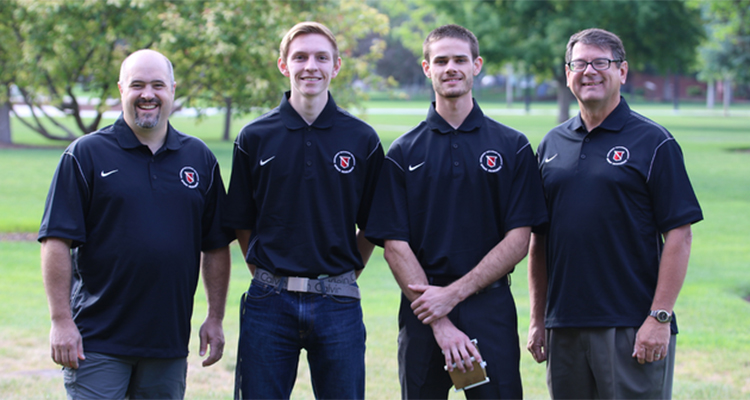NNU team to launch experiment with NASA

For the fifth consecutive year, a Northwest Nazarene University engineering team has been selected by NASA to launch an experiment into space. NNU’s RockSat-X team will launch their experimental payload August 16 on a NASA Terrier Improved Malemute two-stage sub-orbital sounding rocket. The team of students spent the last year designing systems that will test the effectiveness of flexible RFID (Radio Frequency Identification) sensors and ADC’s (Analog to Digital Converters) under the harsh space environment.
Engineering students Braden Grim, Mitch Kamstra, Jameson Krueger, and Tyler Hestand, as well as NNU Department of Physics and Engineering Chair Dan Lawrence and NNU electrical engineering professor Steve Parke, will travel to NASA’s Wallops Flight Facility in Virginia to launch their design alongside the designs of six other universities. This research project is supported by the Idaho Space Grant Consortium and two Boise-based companies — American Semiconductor, Inc. and PakSense.
During NASA’s half-hour flight 100 miles above the Atlantic Ocean, the flexible RFID sensors will be fully exposed to space conditions in order to assess their functionality and durability in the minus-50-degrees-Celsius temperatures and space vacuum. One feature for this experimental payload is a motorized boom that will extend one meter away from the rocket with RF tags attached to send data back to the RF reader.
“RockSat-X has been a great opportunity to get actual engineering experience in the aerospace industry," Krueger said. "This experience will be extremely valuable as we graduate and move into our future careers.”
This year’s RockSat-X payload experiment lays the ground work for another NNU engineering team named RFTSat, which will extend the research from RockSat-X on the RFID and ADC technologies. Working in conjunction with Georgia Tech research labs, RFTSat will test the RF tags in orbit for up to one year after the project’s launch in 2018. The data collected from this project could be used in the future to “tag” satellites and spacecraft in outer space.
Watch the launch of RockSat-X’s experimental payload via live stream on August 16 at ustream.tv/channel/nasa-wallops.
